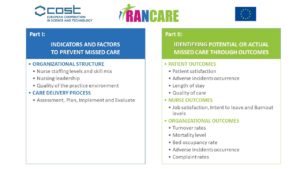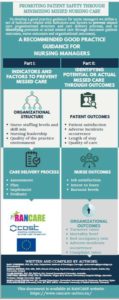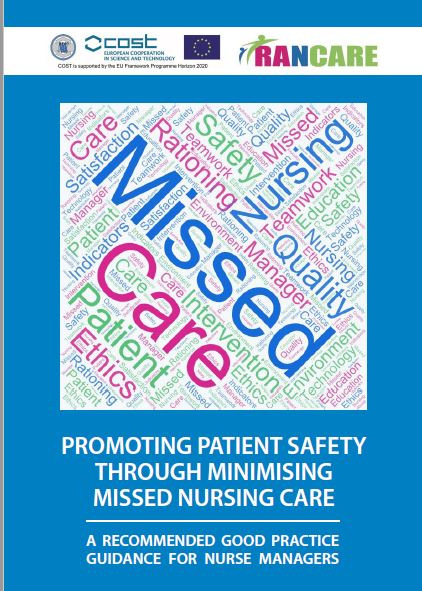RECOMMENDED GOOD PRACTICE GUIDANCE FOR NURSE MANAGERS
Guidance Nursing Managers Rancare
This document was developed as a result of a European Union COST Action project which aimed at facilitating discussion and increasing focus on the issue of missed or rationed nursing care (RANCARE Cost Action 15208
‘Rationing: Missed Nursing care – An international and multidimensional problem’, 2016–2020).



Rationing of nursing care occurs when resources that should be available for nurses to carry out care activities, are insufficient to provide necessary care to all patients, resulting in care being implicitly prioritised, rationalised or missed. This phenomenon is now known as a result of work intensification which creates an environment where allocation of human, time and material resources directly related to care activity is not sufficient to meet care demands, for example, reduced staff numbers, skill mix variation not meeting the acuity related needs of patients, increased demands for care, or a changing patient profile.
The results of these organisational policies are that nurses on a shift are forced to implicitly prioritise, ration or miss care and to work harder with less support. It is also known that such work environments not only negatively impact on nurses’ capacity to deliver care effectively, but also affect capacity of organisations to retain staff, and contributes to patient morbidity and mortality.
Nursing leaders and managers in clinical settings are also faced with the challenges resulting from work intensification, because they are tasked with managing nursing staff and bed availability. Mandates to maintain
clinical governance and patient safety often come within set human and resource targets, regardless of increasing care demands. Despite these directives, nurse managers have an opportunity to ensure that their concerns are heard, by monitoring and reporting situations on a shift that may result in care left undone.
In order to do this, nurse managers need to understand the antecedents of missed nursing care and to engage with available evidence to understand:
- the levels of missed or rationed care within their units,
- the patient, nurse and organisational outcomes associated with
missed care, - the resources or interventions required to enable the delivery of high quality, safe patient care and minimize missed nursing care.
 This document is intended to provide nurse managers with an outline of relevant data sources which examine and contextualise the impact of missed care. Critically it contains a number of suggestions for data gathering and interventions which may help them to support and give nurses some orientations to make effective decisions when faced with challenges or shortages. It is not prescriptive, rather it should be seen as a practical guidance designed to support managers and nurses in clinical leadership positions in all care settings, to address the antecedents of missed and rationed care.
This document is intended to provide nurse managers with an outline of relevant data sources which examine and contextualise the impact of missed care. Critically it contains a number of suggestions for data gathering and interventions which may help them to support and give nurses some orientations to make effective decisions when faced with challenges or shortages. It is not prescriptive, rather it should be seen as a practical guidance designed to support managers and nurses in clinical leadership positions in all care settings, to address the antecedents of missed and rationed care.
This document provides some orientations related to organisational policies that may help prevent or minimise missed care events within their authority. These recommendations include information on staffing levels and skill mix, audit and quality measurement tools, and education and training interventions.
This document is likely to be of interest to some of the following:
- National Nursing Associations
- Regulatory bodies on nursing and health
- Nurse Managers at all levels
- Health professionals
- Hospital managers, health care institutions
- Quality departments
- Nurse educators and their professional associations
- Nursing students (undergraduate and postgraduate levels)
- Nurses in clinical leadership positions.


